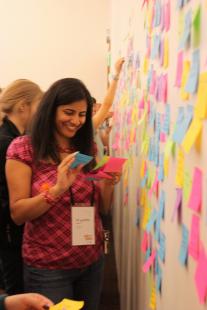Many times after a lengthy meeting, participants are left exhausted, unclear on objectives, and feeling the meeting wasn’t effective at all. In some unfortunate cases, the meeting may have even been used as a way to bureaucratically postpone a decision that needed to be made.
It’s time to throw all you know about meeting planning out the window and consider some game-changing ways to approach these necessary gatherings. Effective meetings are decisive, revitalize team objectives, inspire innovation and new ideas, as well as increase collaboration and connection between team members.
Here are 3 tips to revamp your meeting strategy:
1. Gamestorm
A fresh and light-hearted way to engage team members while accomplishing meeting objectives, gamestorming (a cross between playing games and brainstorming) is being adapted by businesses looking for innovation and results from their teams. If you have important tasks or decisions at hand, gamestorming is a sure-fire way to host more effective meetings, instead of wasting time on uninspired and bland traditional brainstorming meetings. For example:
- Have team members write initiatives and the accompanying pros and cons on sticky notes. Then force them to prioritize the sticky notes in a collective list.
- Team members draw 6-8 sketches of concept ideas from a set of specified goals.
Check out this robust and growing list of game options for ideas. Whichever way you choose to play, you can bet that your team members will appreciate the refreshing approach and the interactions that result.
2. Follow the Modern Meeting Standard
Plan meetings to be “purposeful, intense, and short” in order to get the most out of your time and effort as a team. The Modern Meeting Standard is a framework developed by Al Pittampalli, a former IT advisor at Ernst and Young, who has consulted with the likes of Google and numerous other Fortune 1000 companies to emphasize his modern meeting philosophy.
Whether planning or attending a meeting, focus on the following:
- Decision-making: Enter the meeting with a decision already made. This way your team can analyze and discuss the implications of the decision or propose alternatives.
- Commitment: Commit to your action plan and make sure your team members are on board. Assign and coordinate tasks to your team members and hold them accountable.
- Punctuality: Starting on time is a must. Showing up late wastes time and interrupts the flow of a meeting.
- Preparedness: Team members should be expected to be up to speed and knowledgeable on the information at hand–meaning they have already read and seen the relevant data. If not, they should not attend.
3. De-institutionalize the meeting
As Pittampalli jokes, when the media has a slow news day they end up covering stories that may leave you scratching your head as to whether the story constitutes news. Team members may feel the same about your meetings, as if they are merely “going through the motions” by attending. When meetings are a repetitive, set part of the work week, they start to lose the innovative and thoughtful motivation for staff to make the most of each meeting.
The solution is to make the meeting less of an institution of corporate bureaucracy and more of a creative outlet. Encourage people to think different and open up the structure. Let those with specific expertise speak, while still respecting that everyone’s opinion should be important, regardless of rank. Stimulating dialogue and interaction helps to quell the expected monotony of a traditional meeting agenda.
Overall, meetings are a valuable and necessary means to collaborate and communicate. Just make sure you do them right. In addition to the tips above, OpenSesame provides plenty of great courses on hosting more effective meetings. Check out the ‘Meeting Master’ bundle or ‘Leading Team Meetings‘. With a creative and fresh approach to collaboration, you will be surprised what you can get from your team.
| Do’s | Dont’s |
|
|
Image Credit: Elitatt on Flickr






